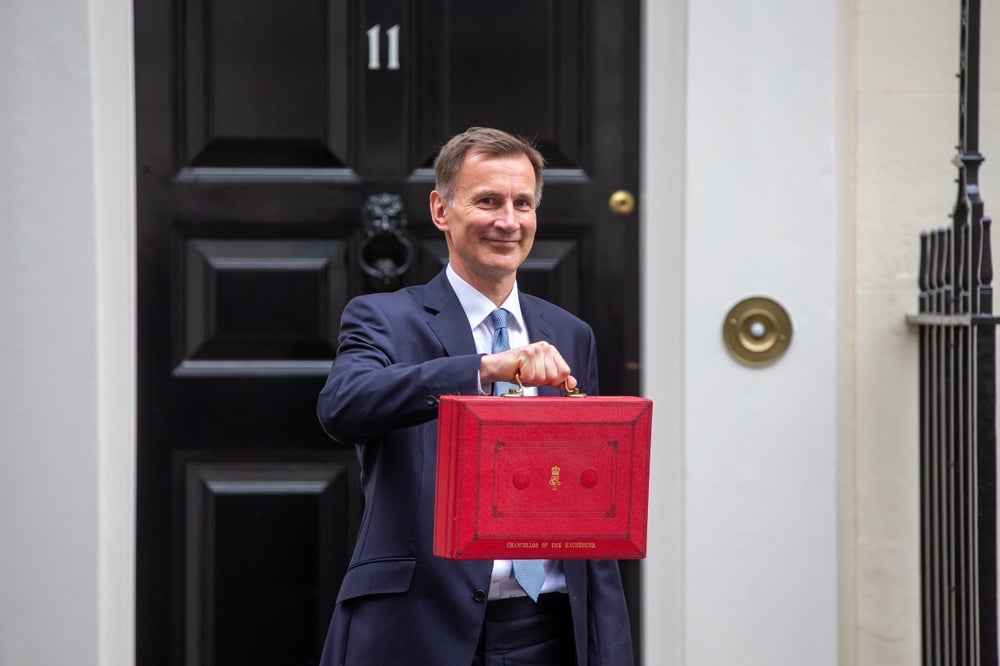
The contents of the UK’s next Autumn Statement remain much a mystery, even more so how markets may react.
Hunt previously stated to the IMF in Morocco that there was no room for tax cuts.
However, reports are saying now that National Insurance is set to be cut and there will be a £10bn ($12.5bn) tax break for businesses. Currently, National Insurance is at 12% between £12,571 and £50,271 and an added 2% for anything over that.
But how will markets react to the upcoming Autumn Statement? PBI asks the experts.
Myles Milston, co-founder and CEO of Globacap
Today’s announcement means that a huge amount of extra capital will be available for VCs in the UK to invest in high-growth industries such as the tech sector. These VCs will then have to deploy this capital which means finding more investment opportunities, taking more risks and investing in more early-stage companies. Over time, this will be really positive for the start-up and innovation ecosystem in the UK, enabling entrepreneurs to access funding earlier in the cycle and accelerate their businesses quicker, similar to how the VC landscape currently works in the US.
Historically, investors like pension funds have battled with laborious, manual and time-consuming private market transactions which often take weeks or months. However, over the past decade, private markets have increased funding, boosted liquidity and embraced automation and technology, making them far more accessible and an attractive alternative to public markets.
How well do you really know your competitors?
Access the most comprehensive Company Profiles on the market, powered by GlobalData. Save hours of research. Gain competitive edge.

Thank you!
Your download email will arrive shortly
Not ready to buy yet? Download a free sample
We are confident about the unique quality of our Company Profiles. However, we want you to make the most beneficial decision for your business, so we offer a free sample that you can download by submitting the below form
By GlobalDataThe UK is the number one tech hub in Europe by some margin, and number three in the world, boasting a tech sector with a combined market value of $1tn. Encouraging pension funds to invest in fast-growing tech firms will not only give the industry a boost, it also gives UK pensioners the opportunity to profit from UK tech innovation.
Yoko Spirig, co-founder and CEO of Ledgy
We are in the midst of a funding crunch, so early stage companies will welcome any new sources of capital, and it’s good that the government is addressing the funding gap in the tech industry, where London and the UK is still world-leading.
However, it’s worth remembering that for UK companies, managing new pension fund investors may be quite different to traditional venture capital (VC) investor relations. VC investors are used to dealing with scaleups where the business model is higher risk. There are well-known examples of pension funds elsewhere in the world that have very strong early track records with early-stage companies, like Ontario Teachers’ Pension Plan. While it will need a real mindset shift from UK pension funds – which right now are 70% invested in bonds – to give scaling companies and founders the support they need, it’s definitely encouraging for the industry as a whole.
Andy Butcher, branch principle and chartered financial planner, Raymond James
Contrary to the expectations of some, the Chancellor did not cut inheritance tax. Given that scrapping it would cost the Chancellor over £7bn annually, more immediate needs elsewhere in the economy have taken precedence in today’s Statement. However, promises to cut inheritance tax may well resurface in the run up to the next general election.
Richard Berry, founder of Goodmoneyguide.com
The Chancellor wants investors to tell Sid again. But times have changed and Sid’s unlikely to be listening, even to those who remember him.
The privatisation of British Gas in the 1980s captured the public imagination because back then buying shares in an individual company was prohibitively expensive for smaller investors.
Nowadays millions of people routinely invest directly in the stock market, and the average investor is far more sophisticated.
The Chancellor’s plan is good news at least for fintech brokers, who will no doubt be upset about the lack of guidance in the Autumn Statement about fractional shares in ISAs. I’m sure the hefty commission they will charge the Government for selling its Natwest shares will help.
But while the sale of the Government’s 39% stake in Natwest to retail investors will create plenty of headlines, the Chancellor shouldn’t count on a stampede of buyers.
Nigel Farage might not be able to resist the chance to snap up shares in his former nemesis.
But with retail investors enjoying so much choice now, the price the Government asks for its shares will be key.
Plus, Natwest shares currently look like a dog of an investment to me. Although they did go up about 10% after the bank’s spectacular falling out with its vocal former customer, so if the bank’s board continues to make sensible decisions the shares may be worth a buy.
Sian Steele, head of tax, Evelyn Partners
A bit more take-home pay will be very welcome to millions of workers and the Chancellor was keen to present a fresh narrative of tax cuts. Despite Mr Hunt’s emphasis on the self-employed, our table shows that the gain in take-home pay across many income levels is greater for the employee.
But these reductions in NI – costing the Treasury £9billion of the £172billion total take from this tax – will do little to counteract the rising tide of direct taxation that has taken the overall tax burden to the highest levels in 70 years.
To put it into perspective, the freeze policy on tax thresholds* that has been in place since 2021 – as well as the cut to the additional rate threshold to £125,140 in April 2023 – will be earning £29.3 billion a year for the Treasury by 2027-28. That is equivalent to a 4p increase in the basic rate of income tax.
That substantial shift in the tax landscape is driven largely by the fiscal drag effect as the incomes of millions of people surge across the personal allowance and the higher and additional rate thresholds – so that people start to pay tax for the first time, or are drawn into paying tax at higher marginal rates.
Hunt has favoured NI over an income tax cut for various probable reasons. NI is focused specifically on income from work, while income tax applies to a number of other sources of income, so an NI cut can be presented as an incentive and a reward to workers, while also having the benefit of being cheaper for the Treasury.
You do not pay NI on any private pension income or at all after state pension age**, so that most retirees will not benefit from this cut – and so it can perhaps deflect some criticism from any perceived inter-generational “unfairness” of hiking the state pension by a hefty amount under the triple lock.
*Excepting the NI threshold rise in 2022/23 that brought the starting level band in line with the annual personal income tax allowance at £12,570.
**Class 4 NICs can continue until the end of the tax year when a worker reaches state pension age.
Will Fraser-Allen, chair of the Venture Capital Trust Association
We are delighted the Government has confirmed that the current sunset clause which applies to Venture Capital Trusts (VCTs) will be extended to 2035. The Chancellor’s commitment today is the right decision for the UK economy.
The VCTA has been demonstrating the positive impact made by our members throughout the UK, through their investment in the next generation of early-stage businesses. However, there has been much uncertainty caused by the Sunset Clause which has been detrimental to the VCT scheme. By removing this uncertainty, we can now support the cross-party consensus that has now emerged, which recognises that early-stage companies are the engine of growth across the UK; that small firms generate employment opportunities and drive innovation.
This is positive news for the VCT sector, the entrepreneurial businesses that VCTs support and all those that have invested in VCTS.
Nicholas Hyett, investment manager at Wealth Club
The announcement that the government is extending the VCT and EIS sunset clauses out to 2035 is good news for two schemes that have supported billions of pounds worth of investment into UK start-ups. It removes uncertainty that has been lingering over the sector for some time, potentially putting off new entrants and new investors, and secures a crucial source of funding for the UK’s blossoming start-up scene.
It is a shame that the sunset clause hasn’t been abolished altogether – which would have avoided a repeat of the current uncertainty in a decade’s time – but with the Labour Party also voicing support or the schemes the extension is welcome nonetheless.
Jonathan Andrew, CEO of Bibby Financial Services
We welcome the permanent adoption of 100 per cent full expensing on qualifying capital spending. Particularly given the current turbulent market conditions, this will give small and medium sized enterprises (SMEs) a massive confidence boost and underpin their resilience. It presents an opportunity for SMEs to do something different to stay ahead of the competition, whether by investing in cutting edge equipment that improves productivity or by pivoting their business offering.
In our most recent research among SMEs, 65% of respondents told us they would like to see the next government implement tax incentives to support them. Today’s announcement is a welcome indication that politicians are responding to their needs.
Andrew Dixon, head of wealth planning, SG Kleinwort Hambros
The Chancellor’s recent announcement of the massive pensions shake-up sounds good in theory. In practice, this can be difficult to get off the ground due to the legacy of pension system and complexity for employers. It is also difficult to see the benefit of both the pension dashboard and a pension for life as they are both aiming to solve the same issue. However, innovation is welcomed in the sector, to ensure that tomorrow’s pensioners will be able to make the most of their well-deserved lifetime earnings. Whether people are planning for a comfortable retirement or helping out family, it is important they are being offered the right tools to achieve that.
Pleased to see the establishment of investment vehicles to channel pension funds into start-up companies. As a passionate supporter of the venture space in the UK, it is pleasing to see the Government focusing on innovation, and from a personal finance perspective, extending the sunset clause on Venture Capital Trusts and Enterprise Investment Schemes.







